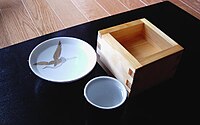
Isolation and characterization of sake yeast mutants with enhanced isoamyl acetate productivity.
Sign Up to like & getrecommendations! Published in 2017 at "Journal of bioscience and bioengineering"
DOI: 10.1016/j.jbiosc.2016.07.002
Abstract: Isoamyl acetate is an important flavor compound in sake. However, production of isoamyl acetate by Saccharomyces cerevisiae is significantly reduced during sake brewing with rice that has a high polishing ratio, because unsaturated fatty acids… read more here.
Keywords: sake; isoamyl acetate; acetate; yeast mutants ... See more keywords

Identification of 4-mercapto-4-methylpentan-2-one as the characteristic aroma of sake made from low-glutelin rice.
Sign Up to like & getrecommendations! Published in 2017 at "Journal of bioscience and bioengineering"
DOI: 10.1016/j.jbiosc.2016.09.002
Abstract: The grassy characteristic aroma perceived in brewed sake made from low-glutelin rice (Oryza sativa L. Mizuhonoka) was examined by gas chromatography-olfactometry and gas chromatography-mass spectrometry. By comparing the odor properties and Kovats retention indices to… read more here.
Keywords: low glutelin; methylpentan one; glutelin rice; sake ... See more keywords

Importance and mechanisms of S-adenosylmethionine and folate accumulation in sake yeast.
Sign Up to like & getrecommendations! Published in 2023 at "FEMS yeast research"
DOI: 10.1093/femsyr/foad004
Abstract: Sake yeasts have a range of brewing characteristics that are particularly beneficial for sake making including high ethanol fermentability, high proliferative capacity at low temperatures, lactic acid tolerance, and high ester productivity. On the other… read more here.
Keywords: sam; sake yeast; sake yeasts; sake ... See more keywords

Improvement of valine and isobutanol production in sake yeast by Ala31Thr substitution in the regulatory subunit of acetohydroxy acid synthase.
Sign Up to like & getrecommendations! Published in 2023 at "FEMS yeast research"
DOI: 10.1093/femsyr/foad012
Abstract: The fruit-like aroma of two valine-derived volatiles, isobutanol and isobutyl acetate, has great impact on the flavor and taste of alcoholic beverages, including sake, a traditional Japanese alcoholic beverage. With the growing worldwide interest in… read more here.
Keywords: acid synthase; sake; regulatory subunit; valine ... See more keywords